This month, the College of Engineering started its internal search for a new dean following former Dean Steven McLaughlin’s appointment as Provost of Academic Affairs. On Tuesday, the college hosted a virtual town hall for students, faculty, and faculty to learn about the search process and to discuss the qualities of the ideal candidate. Ayanna Howard, chair of the search, presented the town hall along with search director Michael Toney.
Howard emphasized the aggressive search timeline, saying that finalists would be selected by late November. She encouraged all members of Tech’s bodies to participate in the process by reaching out to her with thoughts about the person they’d like to see in the position.
The search team will start examining applications on October 30th and will begin interviews in early to mid November. Finalists will “come to school” virtually in late November and early December to give talks about their vision for the school.
Toney and Howard highlighted the importance of community involvement, especially in the nomination part of the process.
“Don’t assume someone else is going to nominate the person you’re thinking about,” said Howard. The team is open to non-traditional candidates and encourages the Tech community to consider potential candidates for qualities beyond “hard skills.”
Howard advised attendees to attend finalist interviews, talk to candidates, and contact the team. “We need to hear everyone’s voice.” For Howard, the future dean should have a commitment to anti-racism and should be open to starting a conversation about discrimination within the college, “terrifying as it may be.”
Through the Q & A function on BlueJeans, attendees shared issues concerning the search and the candidates. One person commented, “I have greatly appreciated Provost McLaughlin’s focus on student mental health – this should continue to be a focus for the next Dean!”
Provost McLaughlin and Howard raised the importance of a more holistic experience for students and faculty in the college.
“Students have started to think about their roles as responsible engineers,” said McLaughlin. For him, the college needs to think about the priorities that the new and current students have, which are different from the ones students had 10 years ago.
Another concern brought up by an attendee was the “improvement of equity in pay, treatment, and priority across the staff supporting the college.”
McLaughlin responded by saying that “First is diversity, equity, and inclusion. Everything that has happened in the last six to seven months has highlighted student and staff experiences at Tech.” The second tenet of an equitable college is student wellbeing and mental health.
The third and final criterion is an improved work environment — with an increased workload and the introduction of the OneUSG system, an emphasis on the wellbeing of staff is necessary. One participant asked about the rationale behind an internal-only search with such an aggressive timeline.
“We’re in a really complex time. Being honest, we have a deep and exceptional pool of candidates internally, so that was a driving factor. If you did a national search, the general feeling is that Tech would pick an internal candidate anyway, and I think that’s true to an extent. It just felt like we had an absolutely stellar group. And the timeline is also aggressive just because of the moment — there is no reason to wait,” said McLaughlin in response.
Questions about the stature of the future dean were raised.
“Often universities look for individuals who have an external stature, eg. National Academy of Engineers (NAE) members, how are we balancing external stature with institutional knowledge?”
McLaughlin replied that “CoE is a large and complex organization. We have some cultural traditions around how much work gets done in the dean’s office and how much gets done in the schools. The vast majority of money goes to the schools. We need someone who can appreciate that. Other universities tend to be much more centralized.”
He continued by claiming that the college needs “someone who can leverage the strength of our incredible schools” and be “an effective leader internally.”
When asked about the most important qualities in a candidate, McLaughlin answered,
“We exist to serve students. We don’t exist to serve the state and we don’t exist to serve companies. It’s a people-oriented job—to oversimplify, IQ and EQ. It’s not good enough to have extraordinary credentials. How you treat people matters. People with high EQ tend to do better. Leading means bringing people along, not just having strong ideas.”
Panelists and participants discussed strategies to avoid new forms of bias that have emerged in the wake of the pandemic (eg. the potential interview complications for a candidate looking after children at home).
“Making sure that bias doesn’t creep in is really important. We need to acknowledge it,” said McLaughlin.
Because the finalists will be known and their talks will be public, the search team is confident in the transparency of the process.
“Many people will know the finalists, so I think there will be more candid feedback,” said McLaughlin.
Until the next dean has filled the position, Associate Dean for Academic Affairs and engineering professor Laurence Jacobs will serve as Interim Dean.
